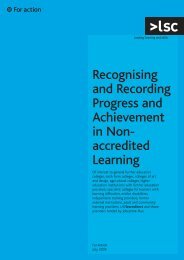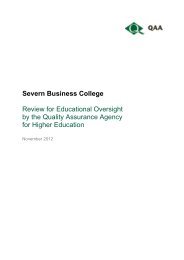Faiths and further education - Church of England
Faiths and further education - Church of England
Faiths and further education - Church of England
- No tags were found...
You also want an ePaper? Increase the reach of your titles
YUMPU automatically turns print PDFs into web optimized ePapers that Google loves.
25Constructing yourown Role in the College67First, ask yourself questions about your own role in the collegecontext.The following questions may help.Questions to ask yourselfStatus68Are you:• ordained or lay• sole chaplain or in a team• ecumenical or multi-faith• open-minded <strong>and</strong> able to work with students <strong>of</strong> all faiths ornone?Conditions69Are you:• full-time or part-time• paid by the college, or by the diocese (or neither)• trained in counselling or listening <strong>and</strong> referring people on• involved in teaching or curriculum development• working within student services• leading worship or regular prayers?Location70Will you be:• on one site or several• in one institution or more than one?Context71Are you going to have:• your own chaplaincy room or a shared space• students who are religious or those who are not• a majority <strong>of</strong> FE students or HE students, vocational or academic,young people or adults• students in the day or in the evening or both?Building relationships with people, young <strong>and</strong> old72How can such relationships be built? Serving chaplains suggest thefollowing:• introducing yourself into the same areas as the young people (forexample, the canteen, reception area)• place the chaplaincy <strong>of</strong>fice near the student reception area• let the college know where you can be found at particular times<strong>and</strong> places.“Our previous chaplain refused to have an <strong>of</strong>fice. Shesaid her <strong>of</strong>fice was the canteen, <strong>and</strong> used to have herbase in a corner, talking to students.” (Muslim chaplain)73How can you do this? Start by:• sitting in the canteen• watching who sits where• sitting at a place where you can talk with people <strong>and</strong> so getyourself noticed• being non-judgmental about language• writing observations down as a diary or as a reflective practicejournal• noting how people express themselves• trying to underst<strong>and</strong> the college climate <strong>and</strong> culture.74In short, though it can take time, getting to know what makes thecollege tick, not being pompous, listening to student conversationsto find out student needs <strong>and</strong> turning your observations intoreflective <strong>and</strong> spiritual practice are key to developing your role.Youcan also meet students through teaching. Many colleges are muchmore willing to fund chaplaincy adequately if team members cancontribute to teaching.Listening75Are you a good listener? Or just a good talker? Can anybody elseget a word in? Your active listening skills may be an area that youidentify early on for extra training.You should be able to identifyproblems for onward referral if they need the help <strong>of</strong> a pr<strong>of</strong>essionaltrained in a specific area <strong>of</strong> physical or mental health.
















